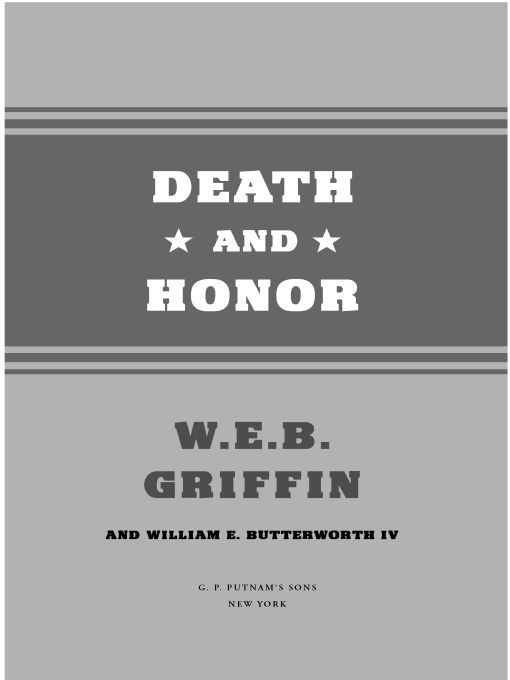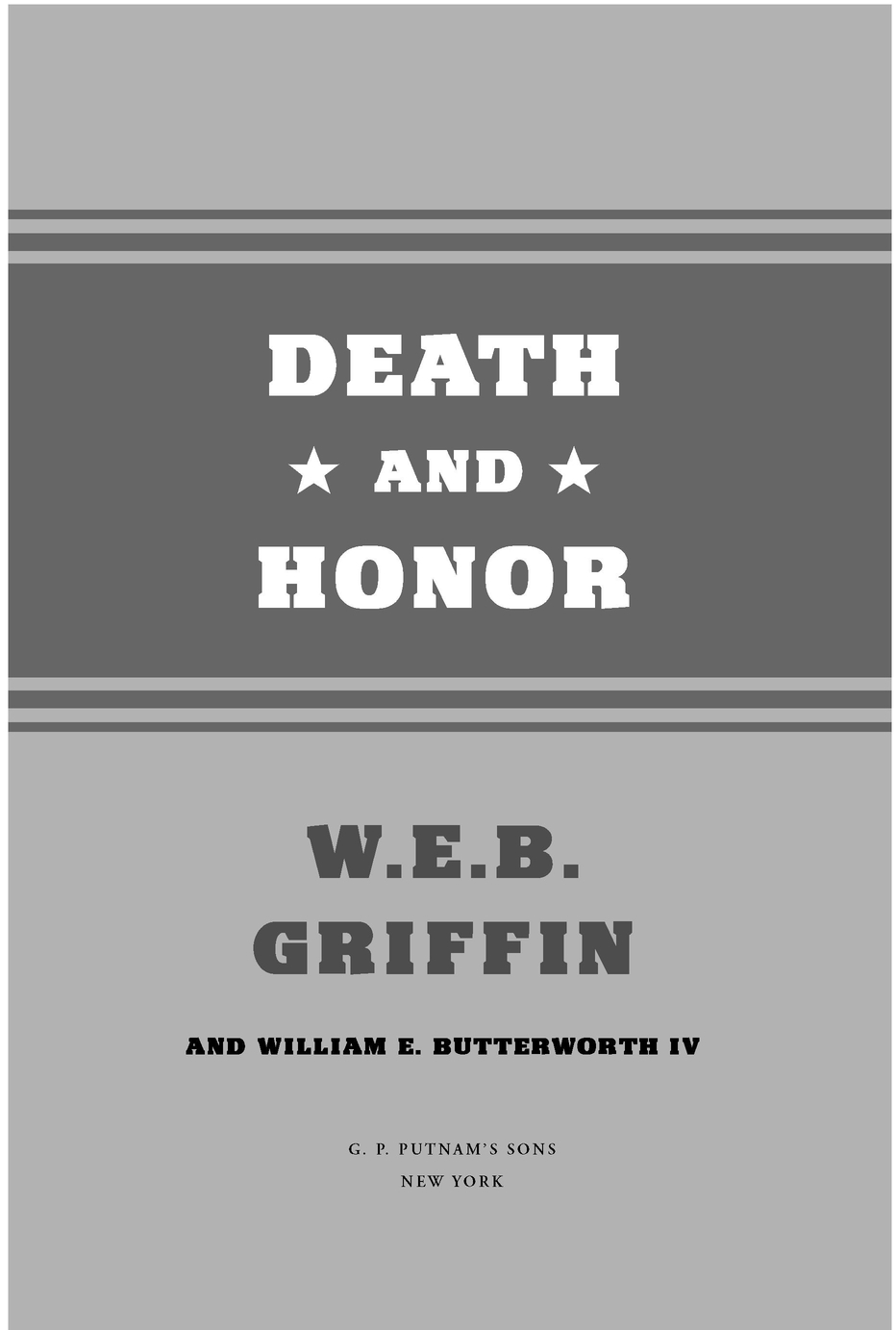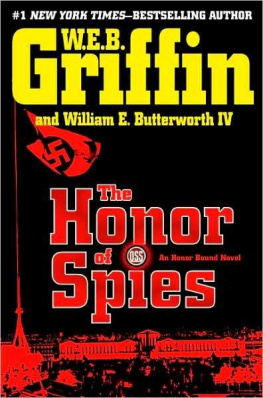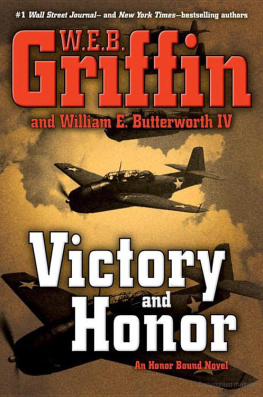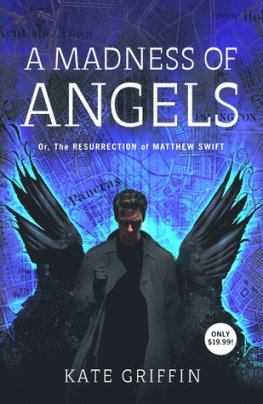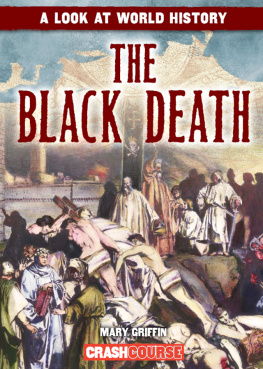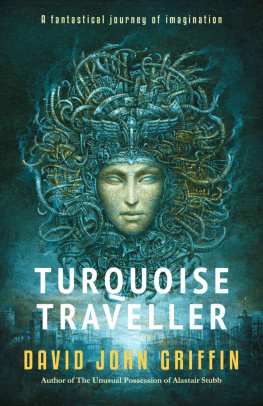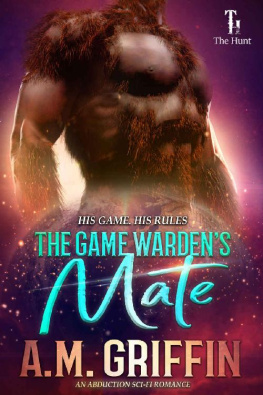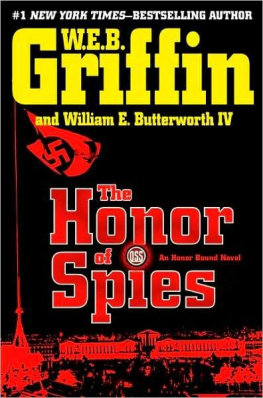Table of Contents
ALSO BY W. E. B. GRIFFIN
HONOR BOUND
HONOR BOUND
BLOOD AND HONOR
SECRET HONOR
BROTHERHOOD OF WAR
BOOK I: THE LIEUTENANTS
BOOK II: THE CAPTAINS
BOOK III: THE MAJORS
BOOK IV: THE COLONELS
BOOK V: THE BERETS
BOOK VI: THE GENERALS
BOOK VII: THE NEW BREED
BOOK VIII: THE AVIATORS
BOOK IX: SPECIAL OPS
THE CORPS
BOOK I: SEMPER FI
BOOK II: CALL TO ARMS
BOOK III: COUNTERATTACK
BOOK IV: BATTLEGROUND
BOOK V: LINE OF FIRE
BOOK VI: CLOSE COMBAT
BOOK VII: BEHIND THE LINES
BOOK VIII: IN DANGERS PATH
BOOK IX: UNDER FIRE
BOOK X: RETREAT, HELL!
PRESIDENTIAL AGENT
BOOK I: BY ORDER OF THE PRESIDENT
BOOK II: THE HOSTAGE
BOOK III : THE HUNTERS
BOOK IV: THE SHOOTERS
BADGE OF HONOR
BOOK I: MEN IN BLUE
BOOK II: SPECIAL OPERATIONS
BOOK III: THE VICTIM
BOOK IV: THE WITNESS
BOOK V: THE ASSASSIN
BOOK VI: THE MURDERERS
BOOK VII: THE INVESTIGATORS
BOOK VIII: FINAL JUSTICE
MEN AT WAR
BOOK I : THE LAST HEROES
BOOK II: THE SECRET WARRIORS
BOOK III: THE SOLDIER SPIES
BOOK IV: THE FIGHTING AGENTS
BOOK V: THE SABOTEURS
(with William E. Butterworth IV)
BOOK VI: THE DOUBLE AGENTS
(with William E. Butterworth IV)
IN LOVING MEMORY OF
Colonel Jos Manuel Menndez,
Cavalry, Argentine Army, Retired
He spent his life fighting Communism and Juan Domingo Pern.
PROLOGUE
Historians now generally agree that the tides of war had begun to turn against the German-Japanese-Italian alliance, The Axis, in the spring and summer of 1943.
From the American perspective, the war had begun with a series of humiliating defeats. The Japanese attack on Pearl Harbor on 7 December 1941 saw most of the battleships of the U.S. Pacific Fleet either lying on the bottom or so seriously damaged as to be out of action for the foreseeable future. The next day, the Japanese attack on the Philippine Islands destroyed half of General Douglas MacArthurs air force.
Before the month was out, MacArthur was forced to declare Manila an open city and retreat to the Bataan Peninsula and the island fortress of Corregidor. On 23 December, Wake Island fell to the Japanese. Two days later, the British forces in Hong Kong surrendered.
President Franklin Delano Roosevelt ordered MacArthur to Australia. MacArthur arrived 20 March 1942, delivered his famous I Shall Return speech, then learned there were only thirty-four thousand soldiers in Australia and very little supplies.
On 18 April 1942, Lieutenant Colonel Jimmy Doolittle led a small flight of B-25 Mitchell medium bombers in a raid on Tokyo. They took off from an aircraft carrier on what most of them considered a suicide mission, knowing the actual damage they could do was minimal, but that some victoryalmost any victoryagainst the Japanese was necessary to prevent despair among the American people.
The exultation of the American people when they learned of the raid was short-lived. Just over two weeks later, on 6 May 1942, Lieutenant General Jonathan Wainwright was forced to surrender all U.S. forces in the Philippines. It was the largest surrender in American history.
In early July, MacArthur learned that the Japanese were about to build an air base on Guadalcanal, in the Solomon Islands. If the base was built, the Japanese could both attack Australia and interdict supply of Australia by sea.
Less than a month later, on 7 August 1942, the just-formed, ill-prepared First Marine Division, which had not planned to go into combat for another year, landed on Guadalcanal. The desperate action almost failed. On 9 August, after losing the cruisers USS Vincennes and USS Quincy and the Australian cruiser HMAS Canberra at the Battle of Savo Island, the invasion fleet was withdrawn. It took with it the Marines heavy artillery, most of the supplies it had planned to put ashore, and even a large number of Marines.
The Marines who remained ashore were on their own. Firing ammunition made for World War I and living off of captured Japanese rations, they not only held on but began to clear the island of Japanese. The airfield the Japanese had been building was captured, finished, and named Henderson Field to honor a heroic Marine pilot. Australia was now safe.
On 17 August, a small group of Marinesone of whom was a son of President Rooseveltof the Marine Second Raider Battalion staged an attack on Makin Island. The short-lived raid was a success not so much for what it accomplished in destroying Japanese supplies, but because it meant the Japanese, fearful of other submarine-launched Marine raids, would have to divert large numbers of troops to protect the islands they had captured.
America, having licked its wounds, was now slowly starting to fight successfully, even in the Japanese-occupied Philippines: On 1 October 1942, a reserve lieutenant colonel named Wendell W. Fertig, who could not bring himself to obey Wainwrights order to surrender, pinned homemade stars to his collar points and nailed a proclamation to a tree announcing that Brigadier General Fertig was assuming command of U.S. forces in the Philippines. Large numbers of similarly minded Americans and Filipinos quickly joined him.
On the other side of the world, in the early fall of 1942, the German army was locked in an enormous battle with the Soviet Union at Stalingrad, and the English were fighting the Afrikakorps under General Erwin Rommel, who threatened to overrun Egypt and with it the critically needed Suez Canal.
The American contribution to that part of the war initially was trying to supply its allies, especially the Soviet Union, which could not win at Stalingrad without a massive infusion of American supplieseverything from aircraft, tanks, and ammunition to food.
The German navy fought this effort by intercepting the supply convoys with hunter packs of submarines. They operated in the North Atlantic near Europe, in the North Atlantic off the coast of the United States, in the Gulf of Mexico, and in the South Atlantic near Argentina and Brazil.
New York and other cities on our eastern seaboard were blacked out primarily so that cargo ships would not be silhouetted against bright lights, making them easier targets for the submarines. This had a further, unexpected result. The citizens ofthese blacked-out cities could see red glows on the horizon as American cargo ships bound for Europe were either torpedoed or shelled, set afire, and sent to the bottom.
The Americans got into combat in North Africa in November 1942. The original actionheavy combatwas not, however, against the Germans. It was against the French.
Although many Americans believedand the Office of War Information tried to convince themthat the U.S. Army would be welcomed in French North Africa, others were far from sure about that.
They remembered that in 1940 many French had cried Better Hitler Than Blum, making reference to a French socialist politician. They knew there were large numbers of French who believed Germany was probably going to win the war, and that the Germans were having little trouble in finding Frenchmen to volunteer for the Charlemagne Legion of the SS.

